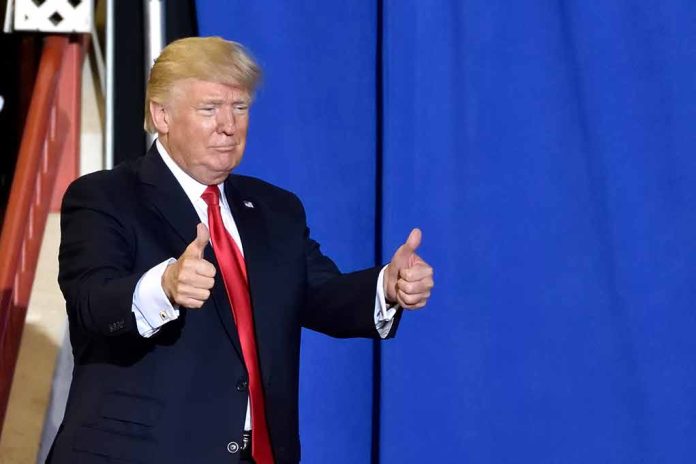🔴 Website 👉 https://u-s-news.com/
Telegram 👉 https://t.me/usnewscom_channel
Donald Trump’s triumphant return to the White House sets the stage for a radical overhaul of America’s economic landscape, promising a seismic shift in trade, immigration, and fiscal policies that will reverberate globally.
At a Glance
- Trump’s re-election heralds sweeping changes in US economic policy
- Proposed tariffs of 10-20% on all imports, with 60% on Chinese goods
- Plans for the largest mass deportation of migrants in American history
- Fiscal policy to focus on tax cuts and potential repeal of parts of the Inflation Reduction Act
- Economists warn of potential inflation and slower economic growth
Trump’s Tariff Tsunami: Reshaping Global Trade
As Donald Trump reclaims the presidency, his ambitious tariff plans are set to send shockwaves through the global economy. The proposed tariffs, ranging from 10-20% across the board and a staggering 60% on Chinese imports, signal a dramatic shift in US trade policy. This aggressive stance threatens to disrupt the delicate balance of international commerce, potentially igniting trade wars and reshaping supply chains worldwide.
Trump’s tariff strategy aims to protect American industries and reduce dependence on foreign goods. However, economists warn that this protectionist approach could backfire, leading to higher consumer prices and slower economic growth. The ripple effects of these policies could extend far beyond US borders, impacting major trading partners like China, Canada, Mexico, and European nations.
“He will at least threaten them with the tariffs and if they don’t negotiate to his liking, Trump will put them on” – Gary Hufbauer
This hardline approach to trade negotiations reflects Trump’s determination to secure what he perceives as fairer deals for America. However, the global economy’s interconnected nature means that any significant disruption to trade flows could have far-reaching consequences, potentially triggering retaliatory measures from affected countries and destabilizing international economic cooperation.
Immigration Crackdown: Economic Implications of “The Great Deportation”
Trump’s immigration policies are poised to be equally transformative, with plans for what he calls “the largest mass deportation in American history.” This aggressive approach to illegal immigration is expected to tighten border controls, lower refugee admissions, and potentially reinstate the controversial “remain in Mexico” policy.
While these measures aim to address concerns about national security and job competition, they could have significant economic repercussions. A drastic reduction in the immigrant workforce could lead to labor shortages in key sectors, potentially driving up wages and, consequently, inflation. Industries heavily reliant on immigrant labor, such as agriculture, construction, and hospitality, may face particular challenges in adapting to this new reality.
“Whether Trump starts to round up people and deport them, both are inflationary and disruptive and makes it difficult for businesses to plan” – Rachel Ziemba
Fiscal Policy Overhaul: Tax Cuts and Regulatory Rollbacks
Trump’s second term promises a significant shift in fiscal policy, with a focus on tax cuts and potential repeals of key elements of the Inflation Reduction Act. With Republicans potentially controlling Congress, the passage of these fiscal measures could be expedited, leading to swift changes in the economic landscape.
The proposed tax cuts aim to stimulate economic growth and job creation. However, critics argue that they could exacerbate income inequality and increase the national debt. The potential repeal of parts of the Inflation Reduction Act, particularly those related to clean energy initiatives, could have far-reaching implications for America’s transition to a greener economy.
Interestingly, some economists predict that certain businesses, particularly those owned by Trump supporters like Tesla and TikTok, may receive exceptions from the broader economic policies. This selective approach could create a complex and potentially controversial economic environment, where political allegiances may influence business outcomes.
As America braces for these sweeping changes under Trump’s second term, the global economic community watches with bated breath. The interplay of aggressive trade policies, stringent immigration measures, and significant fiscal reforms promises to reshape not just the US economy, but the entire global economic landscape. Whether these policies will lead to the promised economic renaissance or trigger unforeseen challenges remains to be seen, but one thing is certain: the world is in for an economic ride unlike any other in recent history.

